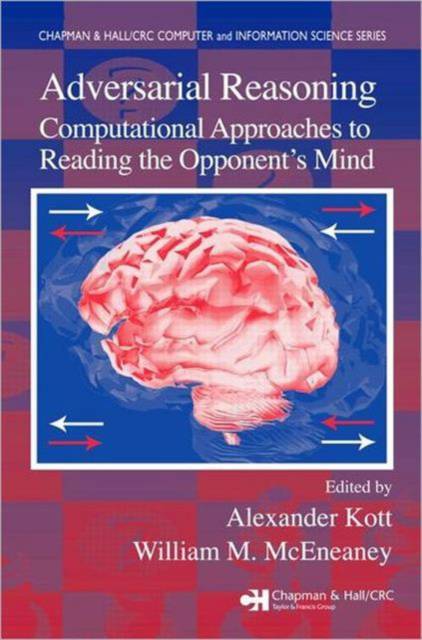
Door een staking bij bpost kan je online bestelling op dit moment iets langer onderweg zijn dan voorzien. Dringend iets nodig? Onze winkels ontvangen jou met open armen!
- Afhalen na 1 uur in een winkel met voorraad
- Gratis thuislevering in België vanaf € 30
- Ruim aanbod met 7 miljoen producten
Door een staking bij bpost kan je online bestelling op dit moment iets langer onderweg zijn dan voorzien. Dringend iets nodig? Onze winkels ontvangen jou met open armen!
- Afhalen na 1 uur in een winkel met voorraad
- Gratis thuislevering in België vanaf € 30
- Ruim aanbod met 7 miljoen producten
Zoeken
Adversarial Reasoning
Computational Approaches to Reading the Opponent's Mind
€ 175,95
+ 351 punten
Omschrijving
The rising tide of threats, from financial cybercrime to asymmetric military conflicts, demands greater sophistication in tools and techniques of law enforcement, commercial and domestic security professionals, and terrorism prevention. Concentrating on computational solutions to determine or anticipate an adversary's intent, Adversarial Reasoning: Computational Approaches to Reading the Opponent's Mind discusses the technologies for opponent strategy prediction, plan recognition, deception discovery and planning, and strategy formulation that not only applies to security issues but also to game industry and business transactions. Addressing a broad range of practical problems, including military planning and command, military and foreign intelligence, antiterrorism, network security, as well as simulation and training systems, this reference presents an overview of each problem and then explores various approaches and applications to understand the minds and negate the actions of your opponents. The techniques discussed originate from a variety of disciplines such as stochastic processes, artificial intelligence planning, cognitive modeling, robotics and agent theory, robust control, game theory, and machine learning, among others. The beginning chapters outline the key concepts related to discovering the opponent's intent and plans while the later chapters journey into mathematical methods for counterdeception. The final chapters employ a range of techniques, including reinforcement learning within a stochastic dynamic games context to devise strategies that combat opponents. By answering specific questions on how to create practical applications that require elements of adversarial reasoning while also exploring theoretical developments, Adversarial Reasoning: Computational Approaches to Reading the Opponent's Mind is beneficial for practitioners as well as researchers.
Specificaties
Betrokkenen
- Uitgeverij:
Inhoud
- Aantal bladzijden:
- 364
- Taal:
- Engels
- Reeks:
Eigenschappen
- Productcode (EAN):
- 9781584885887
- Verschijningsdatum:
- 1/07/2006
- Uitvoering:
- Hardcover
- Formaat:
- Ongenaaid / garenloos gebonden
- Afmetingen:
- 156 mm x 243 mm
- Gewicht:
- 648 g

Alleen bij Standaard Boekhandel
+ 351 punten op je klantenkaart van Standaard Boekhandel
Beoordelingen
We publiceren alleen reviews die voldoen aan de voorwaarden voor reviews. Bekijk onze voorwaarden voor reviews.










